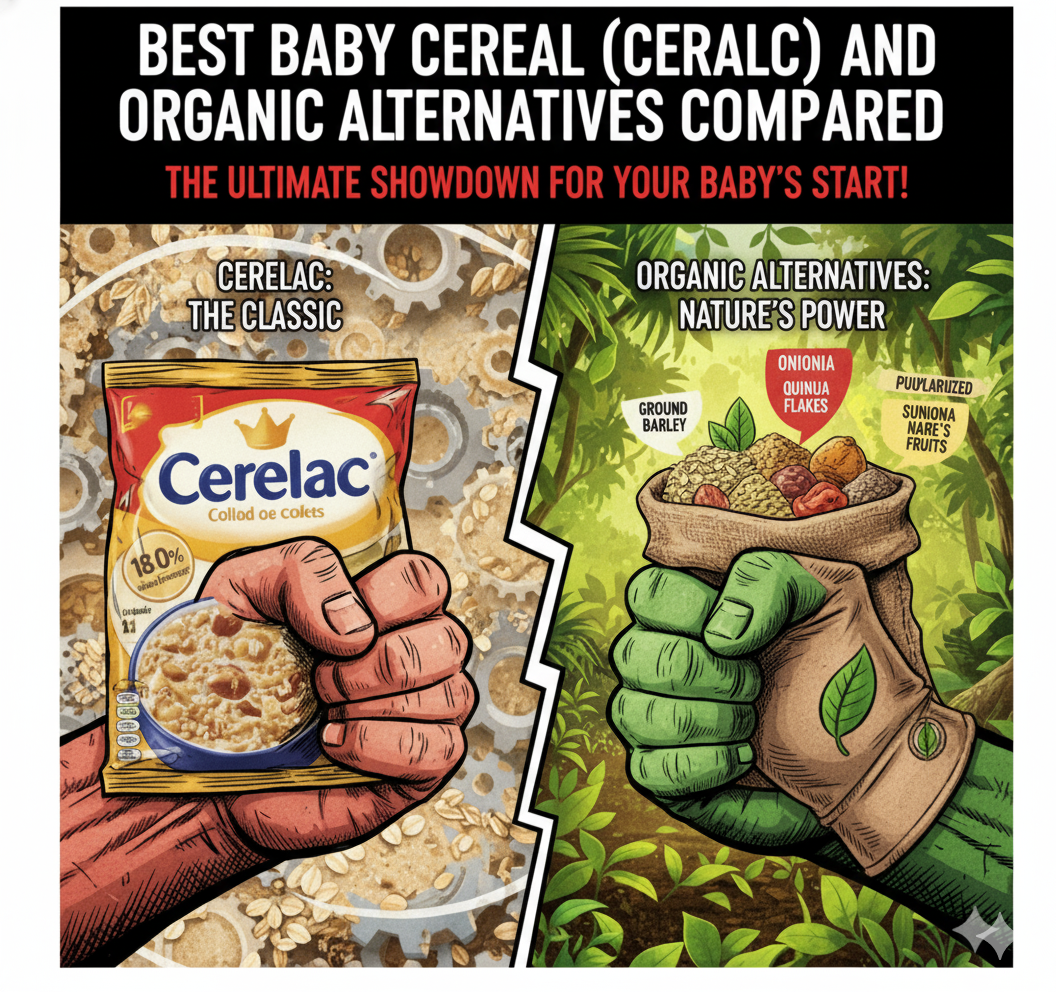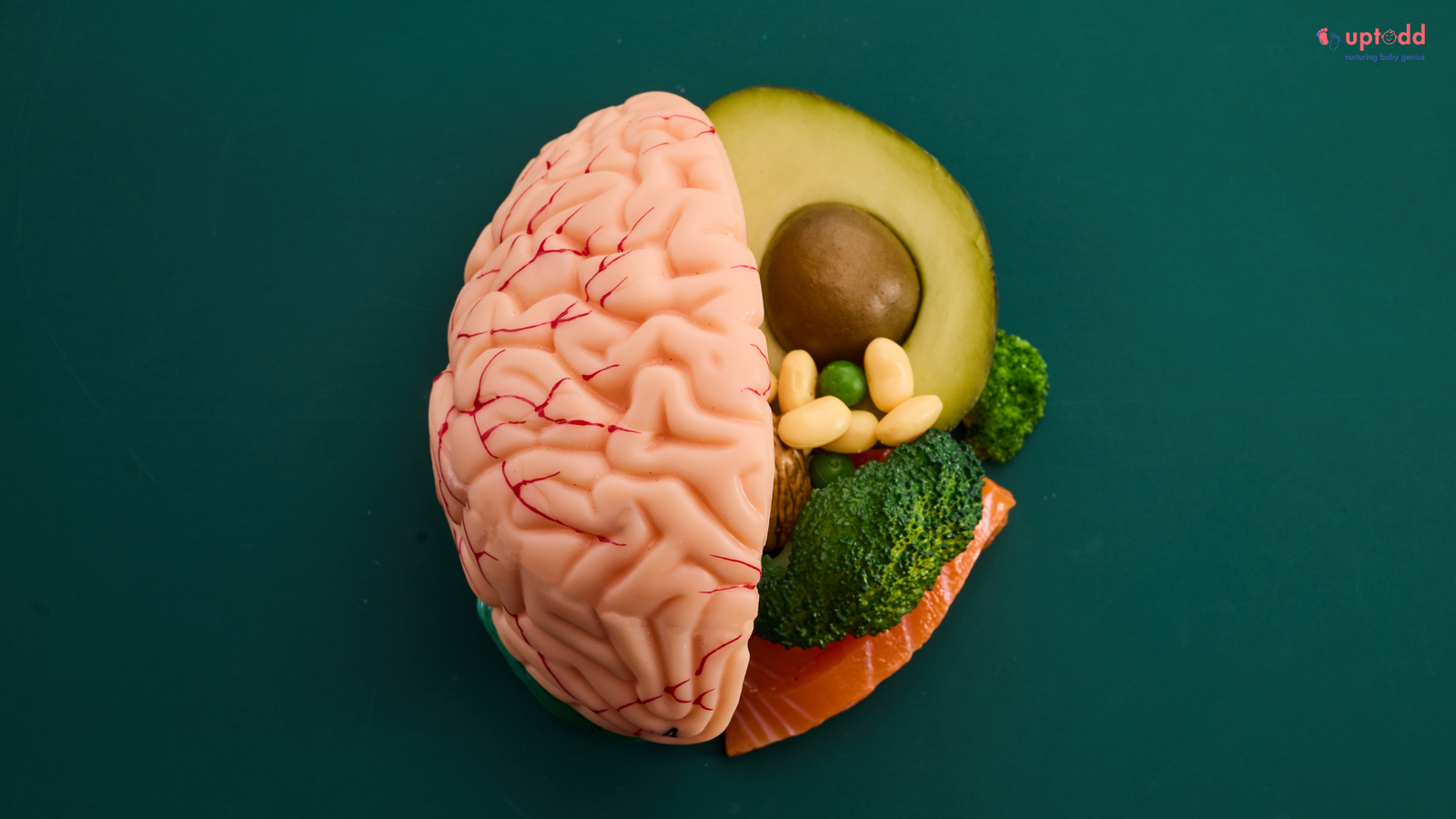
Brain development food for 9 month baby
Topic
Brain development food for 9 month baby
May start as early as
9 Month
─────────
May end around
Never
Completed guide on Brain development food for 9 month baby
At 9 months, your baby’s brain is growing rapidly, forming new connections every second. To support memory, language, and emotional growth, it’s crucial to give the right brain development food for 9 month old babies. This includes nutrient-rich options like egg yolk, mashed fish, iron-rich vegetables, and full-fat dairy. In this guide, we’ll explore the best foods, sample feeding plans, and expert-backed tips to help your baby grow smarter, stronger, and healthier naturally.
In this blog, we will cover-
- Impact of nutrition on a baby’s brain development
- Essential Nutrients for Brain Development
- Top Brain-Boosting Foods for a 9-Month-Old
- Tips for Brain Nutrition
Brain development food for 9 month baby – Impact of nutrition
At nine months, your baby’s brain is developing rapidly, forming millions of new neural connections each second. At this age, babies need proper nutrition because it promotes growth and also supports memory, attention, emotional control, and problem-solving skills.
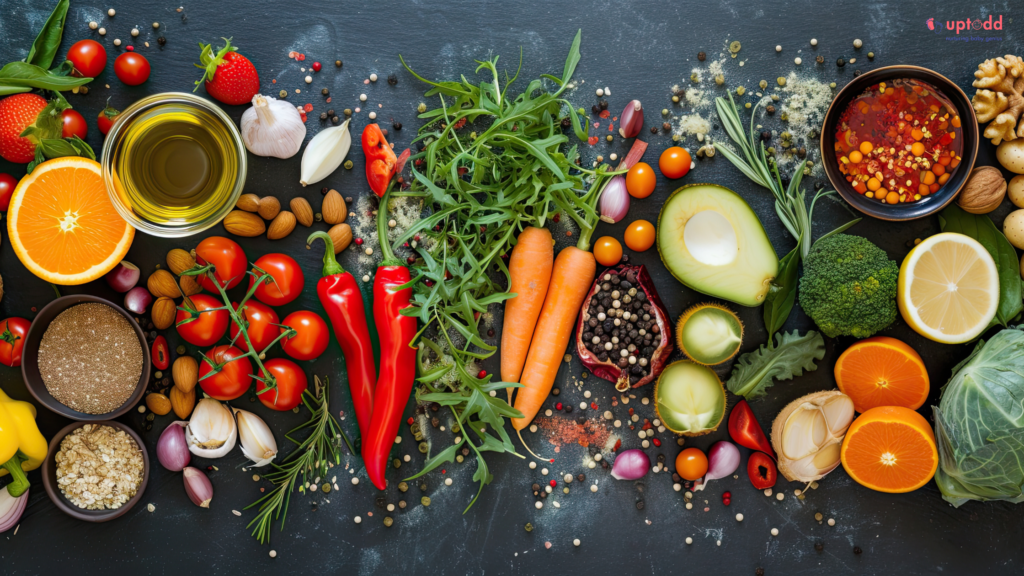
Nutrition is central to brain development in the infant, particularly in the first two years when the brain experiences vast expansion and complex wiring. By the age of 9 months, a baby’s brain grows to nearly 60% the size of an adult brain. Moreover, it actively forms over a million new synaptic connections every second. To build these connections properly, the brain requires an ongoing supply of basic nutrients.
Let us see in a bit detailed manner
The brain is approximately 60% fat, and it needs good fats like DHA (an omega-3 fatty acid) to create solid synaptic connections. DHA is an omega-3 fatty acid that is present in breast milk and some foods, is essential for brain structure development and enhanced visual and mental performance. Iron supports the development of myelin, the insulating cover on neurons that enables faster communication between different brain regions. Additionally, choline helps build memory networks in the hippocampus, while zinc promotes neurogenesis and enhances synaptic transmission. B nutrients, particularly B12, enable the production of energy and the creation of healthy brain cells.
When these nutrients are lacking, they result in delayed language development, difficulty managing emotions, shorter attention spans, and ongoing learning challenges. On the other hand, when infants receive the proper nutrients consistently, they not only foster the creation of healthy brains but also optimize brain function, laying a strong foundation for future intellectual growth, emotional well-being, and academic success.
Now it is time to know about some nutrients and how they help in brain development-

Uptodd Cereal is Live Now !!
Essential Nutrients in brain development food for 9 month baby
| Nutrient | Role in Brain Development | Found In | Target Brain Region |
|---|---|---|---|
| DHA (Omega-3 fatty acid) | Builds brain cell membranes, improves learning and vision | Breast milk, fish (salmon), flaxseed | Cerebral Cortex (especially frontal lobe – decision making, attention) |
| Iron | Supports oxygen transport to the brain, myelination, and neurotransmitter function | Egg yolk, lentils, spinach, fortified cereals | Hippocampus (memory), Basal Ganglia (movement), Prefrontal Cortex (cognition) |
| Choline | Helps with brain structure (formation of cell membranes), supports memory pathways | Egg yolk, breast milk, liver | Hippocampus (long-term memory, learning) |
| Zinc | Supports synaptic transmission and neurogenesis | Pumpkin seeds, whole grains, lentils | Cerebellum (motor control), Prefrontal Cortex (executive function) |
| Protein | Builds brain tissue and neurotransmitters like serotonin and dopamine | Lentils, beans, soft meats, yogurt | Whole brain, especially Neurotransmitter pathways |
| Vitamin B12 | Aids myelination (insulation around neurons), energy for brain activity | Fish, eggs, fortified cereals | Spinal cord and Cerebral Cortex (nerve communication) |
| Vitamin D | Influences brain development, mood regulation, and immune function | Sunlight, fortified foods, and fish | Hypothalamus (mood, hormonal regulation), Cerebral Cortex |
Reference- Role of nutrition in brain development, Key Nutrients for brain development
Now, let us see the top 10 brain boosting foods for 9 months baby
Top 10 brain development food for 9 month baby
Egg yolk and inmportant food for 9 month baby
Egg yolks are high in choline, which aids in brain growth and memory.
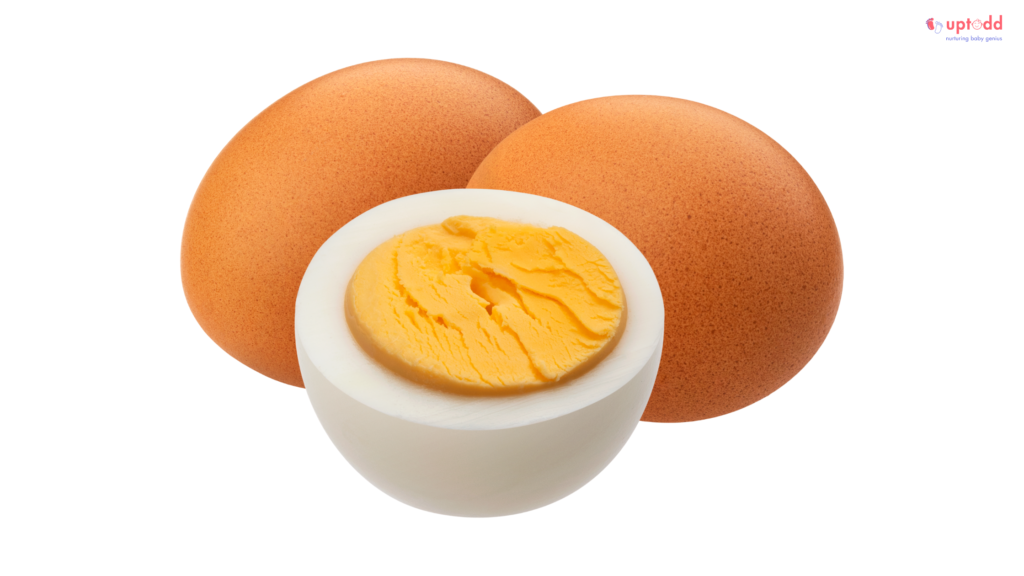
At this age, it can be served fully cooked and mashed for ease of digestion.
Salmon (boneless, cooked)
Salmon contains a high concentration of DHA, an omega-3 fatty acid essential for brain and visual development. Make sure it’s fully cooked, boneless, and flaked into little pieces.
Avocado
Avocado is creamy and nutrient-dense, and it contains beneficial fats that promote brain cell growth. It’s also mild on baby bellies and can be mashed.
Banana
Bananas provide natural energy and vitamin B6, which promotes brain growth. They’re soft, easy to digest, and ideal for a fast snack or mash.
Spinach
Spinach contains iron and folate, which are needed for cognitive function and brain health.
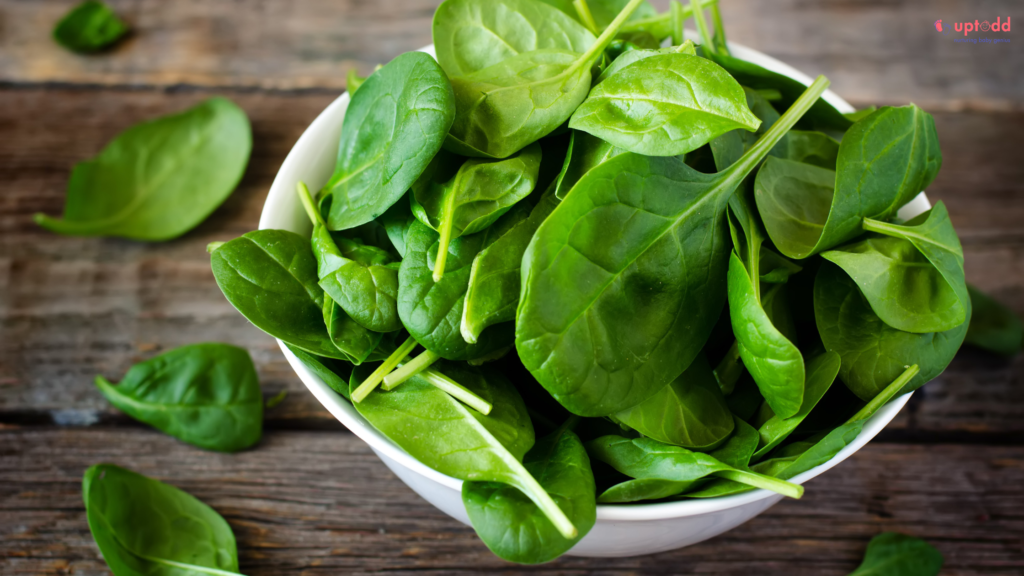
Steam it well before blending into soups, purees, or khichdi.
Almond Powder
When roasted and powdered, almonds provide a source of vitamin E and healthful fats, which promote brain growth. Add a pinch to porridges or fruit purees to boost nutrients.
Pumpkin
Pumpkin is high in beta-carotene and antioxidants, which preserve developing brain cells.
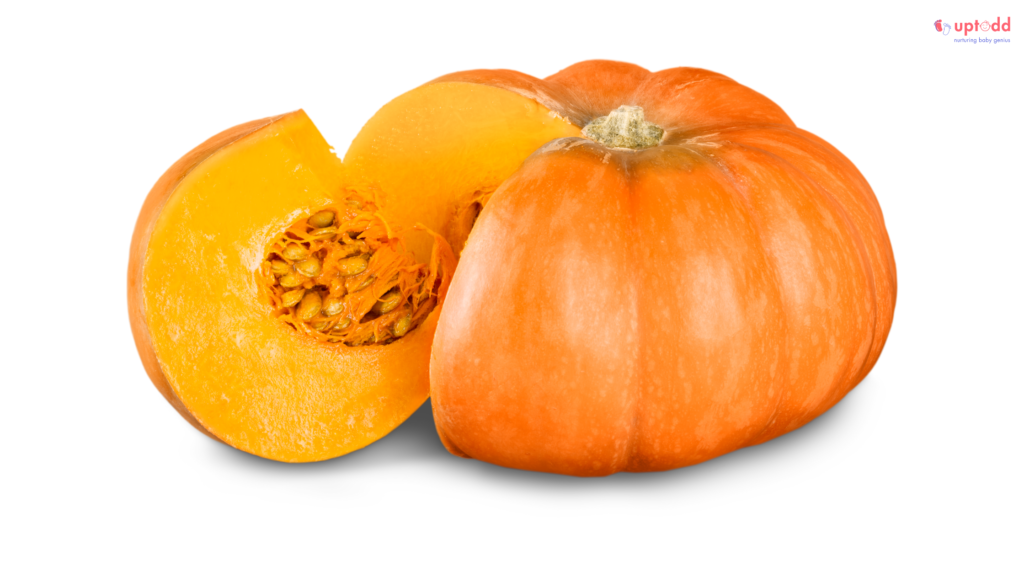
When mashed or pureed, it has a sweet flavor and a soft texture that are suitable for babies.
Ragi (Finger millet)
Ragi is rich in iron and calcium, making it an excellent choice for brain and bone growth. It can be used to make porridge and soft pancakes.
Spinach
Spinach contains iron and folate, which are needed for cognitive function and brain health. Steam it well before blending into soups, purees, or khichdi.
Chicken (boiled and shredded)
Soft-boiled chicken contains protein, zinc, and iron, all of which are necessary for brain development. Make sure it is finely shredded or pureed for easy feeding.
Now that we have explored healthy brain development foods, let’s take a look at a meal plan that you can offer your 9-month-old baby.
Reference- Top Foods for brain development
A healthy Meal plan having brain development food for 9 month baby
Babies usually require three main meals and two nutritious snacks each day at nine months of age.
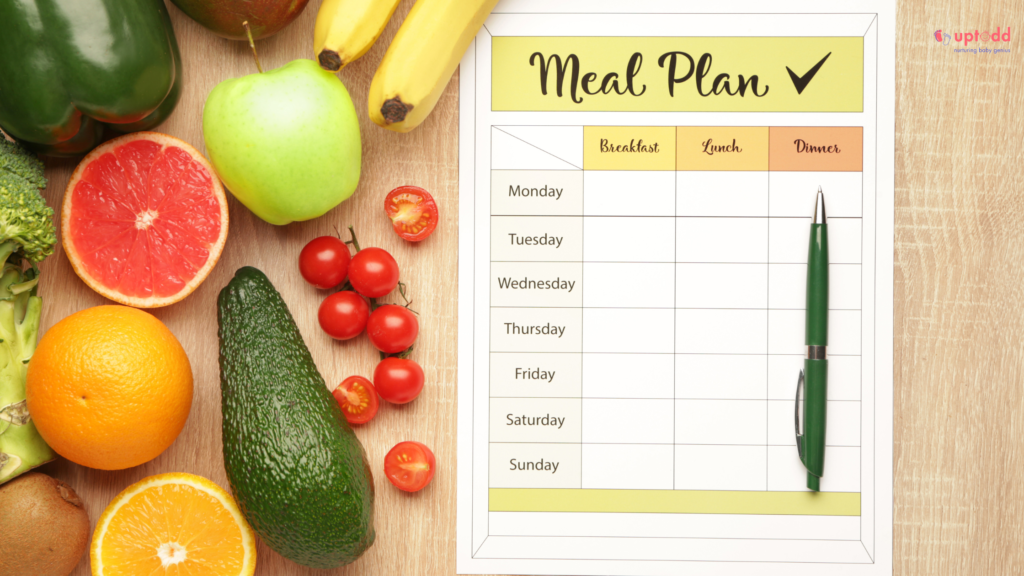
This timetable guarantees steady energy levels and aids in the establishment of regular eating habits.
| DAY | BREAKFAST | SNACK- 1 | LUNCH | SNACK-2 | DINNER |
|---|---|---|---|---|---|
| DAY 1 | Mashed banana with almond powder | Steamed carrot sticks (soft) | Moong dal khichdi with spinach & ghee | Apple puree | Ragi porridge with dates |
| DAY 2 | Oats porridge with grated pear | Boiled sweet potato cubes | Rice with mashed pumpkin and a hint of ghee | Breast milk/formula or fruit yogurt | Mashed avocado + soft-boiled potato |
| DAY 3 | Suji (semolina) porridge with mashed banana | Soft cucumber sticks (steamed) | Mashed rice with moong dal & bottled gourd | Mashed papaya | Lentil soup with soft mashed rice |
| DAY 4 | Ragi pancake with mashed chikoo | Boiled beetroot sticks | Vegetable Dalia with spinach & carrot | Mashed mango | Khichdi with peas and ghee |
| DAY 5 | Poha with mashed potato and spinach | Steamed apple slices | Pumpkin and rice mash with yellow moong dal | Fruit yogurt with almond powder | Suji upma with vegetables (finely grated & soft) |
| DAY 6 | Oats & banana porridge with nut powder | Steamed beetroot & carrot mash | Ragi khichdi with seasonal vegetables | Mashed pear | Mashed paneer with peas and rice |
| DAY 7 | Avocado mash with soft toast sticks | Coconut water with soft grated coconut | Mashed rice with lentils and bottled gourd | Steamed pear puree | Idli with ghee and mashed dal |
Some key points to keep in mind-
- All foods must be soft, mashed, or pureed to suit your baby’s chewing and swallowing capacity.
- Do not use salt, sugar, and honey until 1 year.
- Make use of iron foods like ragi, spinach, and lentils, and combine with Vitamin C-containing fruits to enhance absorption.
- Avoid Cow’s Milk before 12 months because it can cause difficulty in digestion and lack of essential nutrients like iron. Small amounts in cooking or dairy products like yogurt are fine.
- Keep up the breastmilk or formula feeding between meals.
- If you are non-vegetarian, you may incorporate mashed or shredded egg yolk, cooked chicken, fish (such as salmon), or liver into lunch or dinner every day, depending on tolerance and after adhering to the 3-day rule for every new food.
Conclusion
A baby’s first year is a year of amazing brain growth. Nutrition is one of the most effective tools we have to power it. Whether it’s a spoonful of iron-rich khichdi, a DHA-packed bite of salmon, or a simple fruit mash, every meal presents an opportunity to fuel your baby’s future brilliance. Therefore, feed with intention, observe your baby flourish, and take pride in giving them the best possible start in life.
Related Baby Brain & Nutrition Guides
Explore age-specific guides and nutrition tips to support your baby’s brain and body development:
Early & Infant Stages
- Brain Food for 6-Month-Old Babies
Start strong with iron-rich purees and safe solids to kickstart brain growth. - Brain Development Food for 1-Year-Old Babies
Transition to more textures and DHA-rich meals that boost memory and focus.
Toddler & Preschool Stages
- Brain Development Food for 3-Year-Olds
Support talking, problem-solving, and preschool readiness with smart food choices. - Brain Development Food for 4-Year-Olds
Discover the best foods to improve focus, cognition, and emotional balance before school age.
Growth & Weight Support
- ⚖️ Baby Weight Gain Guide (6–12 Months)
Learn how to support healthy weight and brain growth simultaneously with expert-backed diet tips.
All-in-One Resource
- Brain Development Food for Babies: Complete Guide
A comprehensive guide from 6 months to 4 years with food lists, schedules, and growth milestones.
FAQ: Brain Development Food for 9 Month Old Baby
1. What is the best brain food for a 9-month-old baby?
Foods rich in DHA, iron, and healthy fats are best for brain development at 9 months. These include mashed egg yolk, soft fish like salmon, avocados, and full-fat dairy.
2. Can I give eggs to my 9-month-old for brain growth?
Yes, egg yolks are packed with choline and DHA, both critical for brain development. Start with well-cooked mashed yolk and watch for allergies.
3. How to improve brain development in 9-month-old babies?
Feed nutrient-dense foods (fish, dairy, greens), ensure 12–14 hours of sleep, read aloud daily, and engage in face-to-face play to boost memory and learning.
4. Are bananas good for brain development in 9-month-old babies?
Yes, bananas contain glucose and vitamin B6, which support mood, memory, and brain energy. They’re also easy to digest and ideal for self-feeding.
5. How many meals should a 9-month-old baby have in a day?
Most 9-month-old babies need 3 solid meals + 2 snacks daily, including breast milk or formula. At least one meal should include brain-boosting foods like egg, ghee, or green vegetables.
6. Can I give fish to my 9-month-old baby?
Yes, soft and boneless fish like salmon or rohu are excellent for brain development. Start with small portions and ensure it’s fully cooked.

